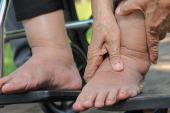Early SGLT2 Inhibition, Spot Urine Sodium Checks May Help in Acute HF
Both approaches improved excess fluid removal, but more data are needed to determine the best strategy, Nancy Sweitzer says.

AMSTERDAM, the Netherlands—For patients with acute heart failure (HF) and signs of congestion, prompt use of a sodium-glucose cotransporter 2 (SGLT2) inhibitor or a natriuresis-guided approach to diuretic therapy both seem to be viable strategies to enhance removal of excess fluid, according to results from two small trials presented earlier this week at the European Society of Cardiology (ESC) Congress 2023.
In DICTATE-AHF, starting dapagliflozin (Farxiga; AstraZeneca) on the first day of hospitalization appeared to improve multiple measures of diuresis compared with IV loop diuretics alone, although the study fell shy of meeting statistical significance on the primary endpoint of diuretic efficiency. Importantly, it suggested that starting an SGLT2 inhibitor earlier than has been explored in prior trials is safe.
And in PUSH-AHF, using a natriuresis-guided approach to IV loop diuretic therapy—with intensification when excretion of urinary sodium was insufficient—bumped up both natriuresis and diuresis, but did not have a significant impact on clinical outcomes at 180 days.
Commenting for TCTMD, Nancy K. Sweitzer, MD, PhD (Washington University School of Medicine, St. Louis, MO), editor-in-chief of Circulation: Heart Failure, noted that both trials, though relatively small and underpowered for assessments of hard clinical endpoints, did show that the respective efforts evaluated in the studies improved diuresis. But other approaches, such as adding acetazolamide to loop diuretics, have been shown to boost fluid removal as well.
“I’m left at the end of the day wondering: what’s the best strategy to effectively diurese people? And I don’t think we know that yet,” she said. “But I will say that as a heart failure doctor, it’s fun to watch people doing diuretic trials finally because [loop diuretics are] the therapy we use in every single one of our patients and there’s been no data to guide us up till now.
There’s been no interest from the pharmaceutical industry, she added, “but it’s such an important clinical question.”
SGLT2 Inhibition for Decongestion
Zachary Cox, PharmD (Lipscomb University College of Pharmacy, Nashville, TN), who presented the results of DICTATE-AHF, noted that some small studies have indicated SGLT2 inhibitors enhance diuresis, although there have been concerns with using these agents very early in an acute HF hospitalization because of the possibility of hypoglycemia, ketoacidosis, worsening renal function, and genitourinary infections. There also have been questions about the magnitude of potential benefit.
To evaluate the impact, the researchers recruited 240 patients (mean age 65 years; 39% women) who were hospitalized with hypervolemic acute HF (regardless of LVEF), had planned or current use of IV loop diuretics, and had an eGFR of at least 25 mL/min/1.73 m2, randomizing them to dapagliflozin 10 mg daily starting on the first day of hospitalization plus structured usual care with protocolized diuretic titration or to usual care alone. IV loop diuretics were adjusted in both treatment arms to aim for a daily urine output of 3 to 5 liters.
The primary outcome was diuretic efficiency, defined as the cumulative weight change divided by cumulative dose of loop diuretics, at day 5 or hospital discharge, whichever came first. Patients in both groups lost about 4 kg in weight during that span, but the diuretic dose was significantly lower in the dapagliflozin group. Although the difference in diuretic efficiency tended to favor the intervention, it fell short of significance (adjusted OR 0.65; 95% CI 0.41-1.01).
Other measures of diuresis indicated a benefit, however, with significantly greater 24-hour natriuresis and urine output in the dapagliflozin-treated patients. That translated into a shorter time to discharge, with 52% of patients in the dapagliflozin arm and 33% of those in the control arm being discharged at the end of 5 days (P = 0.007).
In terms of safety, there were no concerning signs when looking at hypoglycemia, ketoacidosis, hypotension, worsening heart failure, genitourinary tract infections, or kidney function, Cox reported. Numbers of 30-day readmissions for acute decompensated HF or diabetes-related reasons were comparable in the two groups.
The safety is an important message because SGLT2 inhibitors are part of the foundational guideline-directed medical therapy (GDMT) for patients with heart failure and starting them during the initial hospitalization may enhance GDMT use in the chronic phase, Cox indicated. He noted that recent studies have shown that 80% of potential candidates for SGLT2 inhibitors don’t get them early on, with concerns about safety holding back use.
“This study is important in emboldening clinicians that they can safely initiate this key medication early in the hospital stay and then continue that chronically for patients with heart failure,” he said during a press conference, indicating that that would in turn have a beneficial impact on clinical outcomes.
Sweitzer said that even though there are limitations of the study, it does provide “more evidence that aggressive use of this class of agents early in hospitalization is safe.” Getting patients on a component of GDMT early in the hospital stay is attractive, she added. “It is my practice to start these drugs very early in hospitalization, so it’s nice to see additional safety data.”
Natriuresis-Guided Diuretic Therapy
Jozine ter Maaten, MD, PhD (University Medical Center Groningen, the Netherlands), who presented the results of PUSH-AHF, noted that the use of loop diuretics for the treatment of HF, the standard for half a century, doesn’t work well for a lot of patients, underscoring the need for personalized approaches to improve decongestion.
In PUSH-AHF, which was published simultaneously in Nature Medicine, the investigators evaluated whether treatment guided by periodic spot checks of urinary sodium could be the answer. The single-center trial included 310 patients (median age 74 years; 45% women) who presented with signs and symptoms of congestion. They were randomized to natriuresis-guided therapy—with IV diuretic treatment intensified based on an insufficient response, defined as a spot urinary sodium value < 70 mmol/L or diuresis less than 150 mL/hour—or standard of care.
The first primary endpoint was natriuresis, which was effectively improved with the tailored approach—the estimated amount of urinary sodium removed at 24 hours was greater by 63 mmol in that group (P = 0.0061), a difference sustained out to 48 hours. Diuresis also was significantly greater at both 24 and 48 hours.
That didn’t translate into a benefit for the second primary endpoint, however. The rate of 180-day all-cause mortality or adjudicated HF rehospitalization was 31% in both arms of the trial (HR 0.92; 95% CI 0.62-1.38). In-hospital death significantly favored personalized treatment, but overall event rates were low (two vs 14 events; P = 0.0192).
There were no differences in hospital length of stay, HF rehospitalization, 180-day all-cause death, or the percent change in NT-proBNP at 48 or 72 hours.
Natriuresis-guided treatment was safe, ter Maaten said, with no differences in serious adverse events, worsening HF, or true worsening renal function.
The approach studied here would not be difficult to implement, ter Maaten indicated, noting that spot urinary sodium values are easy to obtain, inexpensive, and widely available. “Our results furthermore underscore the use of repeated spot urinary sodium assessments for personalized treatment targets, as already proposed by the current ESC heart failure guidelines,” she said.
It might be premature to implement such an approach, however, because it’s unclear whether natriuresis guidance is better than just being more aggressive with loop diuretic therapy in general, Sweitzer said. “I don’t think we know the answer to that.”
Todd Neale is the Associate News Editor for TCTMD and a Senior Medical Journalist. He got his start in journalism at …
Read Full BioSources
Cox Z. DICTATE-AHF: efficacy and safety of dapagliflozin in acute heart failure. Presented at: ESC 2023. August 28, 2023. Amsterdam, the Netherlands.
Ter Maaten JM, Beldhuis IE, van der Meer P, et al. Natriuresis-guided diuretic therapy in acute heart failure: a pragmatic randomized trial. Nat Med. 2023;Epub ahead of print
Disclosures
- DICTATE-AHF was funded by AstraZeneca.
- Cox reports research contracts from AstraZeneca and other financial relationships with Roche and Translational Catalyst.
- PUSH-AHF was funded by the Netherlands Heart Foundation.
- Ter Maaten reports no relevant conflicts of interest.





Comments